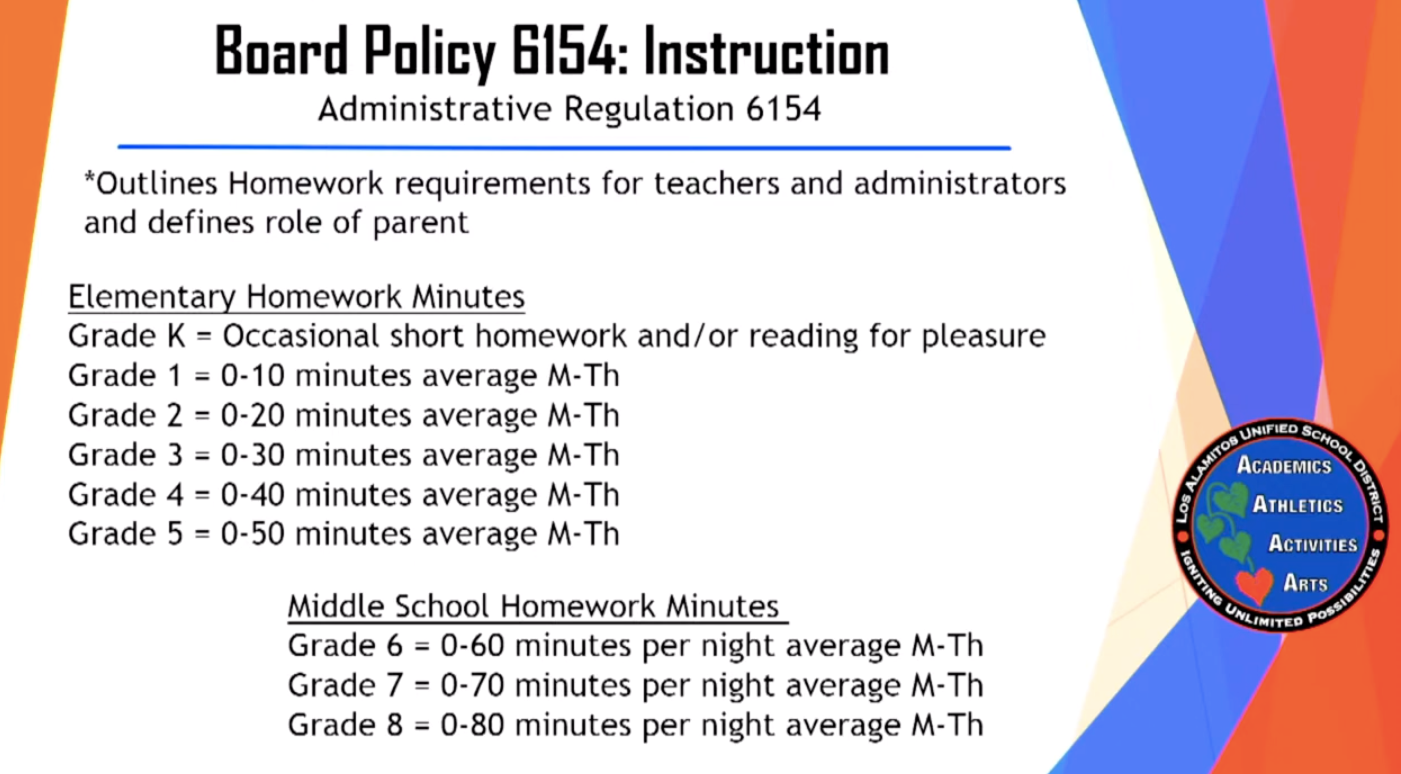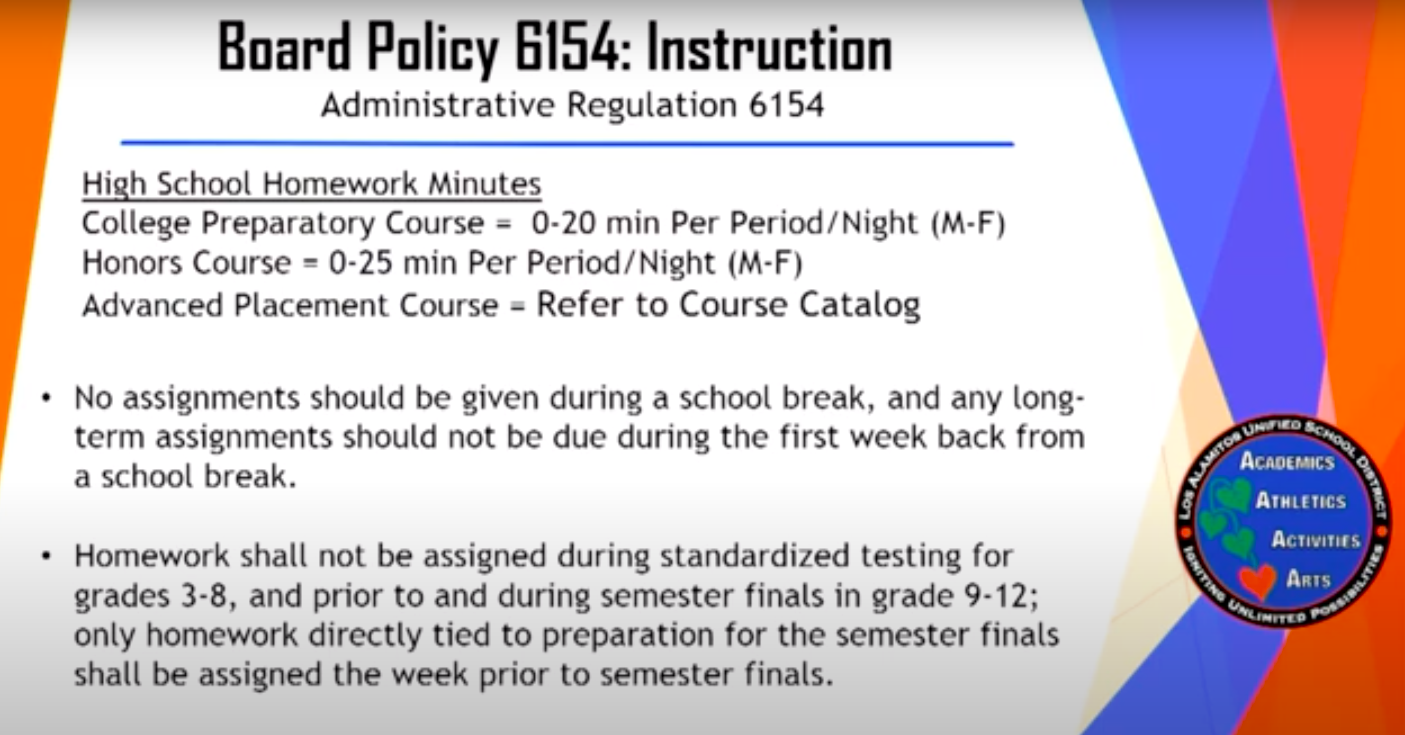Rethinking homework: New policy emphasizes 'quality over quantity'
The Los Alamitos Unified School District Board of Education adopted a new homework policy that translates to less homework overall for students.

Homework is changing for students in the Los Alamitos Unified School District.
After months of development, the district recently updated its homework policy for the first time since 2014. The new policy emphasizes promoting “student wellness and academic rigor” and valuing “quality over quantity” when it comes to assignments students complete at home.
That translates to less homework overall for kids enrolled at the district’s nine campuses in Rossmoor, Los Alamitos and Seal Beach. Classes resume for the 2022-23 school year in August.
“There is a lot of research that supports [that] if you overdo the amount of homework you actually see a negative impact on learning and so we really want to make sure that we're addressing best practices and research and really making sure that our homework has a positive impact on students and student learning,” Deputy Superintendent Ondrea Reed said during her presentation on the revised homework policy at the June 14 Board of Education meeting.
The board adopted the policy in a unanimous vote at its meeting on June 28.
The shift to revise the homework policy was set in motion before Covid-19 appeared in 2020, according to Reed. Families were reporting students staying up past midnight to complete their homework as they juggled commitments to after school sports and activities.
The revised approach to homework has two parts: an update to the board policy (See item 5a on the agenda) and the addition of an administrative regulation (See item 5b on the agenda) which outlines how the policy will be implemented by staff.
The policy states elementary and middle school students will not be assigned homework on weekends. And for all grade levels, no homework would be given over school breaks.
“I think school breaks are very purposeful,” Reed said at the June 14 meeting. “The research really indicates that they're set to give students an opportunity to recharge, also an opportunity for our staff to recharge.”
The new policy includes specific guidelines on the amount of time students should be spending on homework every day creating consistency across campuses and classrooms.

For example, for elementary school, the guidelines are an average of zero to 10 minutes of daily homework for a first grader to an average of zero to 50 minutes per night for a fifth grader. Students can expect an increase of about ten minutes per day as they advance to the next grade level through middle school.
Reed said middle school teachers will create a “conflict calendar” so that students aren’t loaded up with projects or tests in different subjects at the same time.

Calculating the daily minutes of homework time for high school students depends on their courses. A student’s schedule could include college preparatory, honors and advanced placement (AP) courses, with AP courses having the biggest homework load.
Parents of high school students who enroll in multiple AP classes will be advised to review how the workload could impact their child’s overall schedule. In a phone interview, Reed said that parents can make sure that the lifestyle of their child can accommodate their academic load.
NEW POLICY BASED ON RESEARCH, MEETINGS, SURVEYS
Like many projects, the process to revise the homework policy slowed down during the pandemic but ramped back up last November. Reed said the policy is based on reviews of the latest research, input from dozens of meetings among staff, surveys of secondary school students as well as consulting from the Stanford-affiliated program Challenge Success.
An example of the research is a Stanford study that showed students in “high-achieving communities” who spend too much time on homework experience increased stress and physical health problems.
“Effective homework practices do not place an undue burden on students,” the district’s new homework policy reads. “The Board recognizes the value of extracurricular activities, unstructured time, and adequate sleep for a student’s success in school.”
“I think that this board has been very clear that our goal is to educate the whole child,” Board President Diana Hill said at the June 14 board meeting. She stated the new policy promotes academics “but there’s also that balance of being able to give students that opportunity to do those other things that are their passion, that fulfill their lives as well.”
PARENT REACTION
Oliver Lee, a parent of a soon-to-be sixth grader at McAuliffe Middle School, said he welcomed change. Lee said his daughter was spending up to three hours every day on homework during her last years of elementary school.
“I noticed she had an obscene amount of homework. Some of her friends in other classrooms weren’t getting nearly as much as her,” Lee wrote in an email. “She’d have multiple breakdowns crying and stressing she would not finish in time and get benched for recess for not completing some of the work.” Lee said her teachers didn’t have an explanation for the disparity.
Most parents responded positively to the proposed homework policy in a June 16 post on a Facebook group for district parents.
Many commenters applauded less homework as a boost for students’ mental health. “I’m all for a lighter workload. It’s hard seeing your students burned out at the end of a semester,” one wrote.
Other parents had questions including how Jiji, an online math program, would factor into homework minutes and how average homework times would be calculated.
Others wondered if students might miss out on developing other skills with less work at home. “We do not need busy work but on some level we have to teach good study habits,” a parent wrote. Another parent of a student in elementary school commented: “I think homework is necessary and serves a purpose more than just getting an assignment done. It helps my child manage his time to get it done.”
Reed said, once the policy passed, the district planned to start communicating more with parents about how it would implement the new guidelines. She said meetings with families would likely take place in August.
